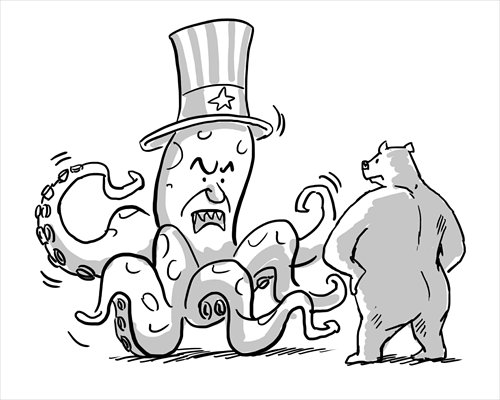HOME >> OP-ED
Moscow determined to follow its own path
By Dmitri Trenin Source:Global Times Published: 2014-4-1 19:48:01

Illustration: Liu Rui/GT
A joke making rounds in Russia these days talks about President Vladimir Putin having "bloodlessly dismantled the G8." At their recent meeting in The Hague, the leaders of the leading Western nations suspended their activities in the G8 format and reverted to the G7 model of a purely Western club.
In the 16 years of Russia's informal membership in the G8, Russia has failed to become fully integrated into the US-dominated global system, and now it has openly challenged it in deeds, not just in words. This has important global consequences.
In and of itself, the demise of the G8 will not have much of an effect on Moscow's foreign policy. Since the departure of German ex-chancellor Gerhard Schroeder and French ex-president Jacques Chirac in the 2000s, Putin has hardly had a soul mate there.
Symbolic measures such as the suspension, and quite possibly the dismantlement, of the G8 are important for what they represent. In this case, the real change is the end of the almost 25-year-long period of Russia's association with the West.
This association, despite the efforts of three Russian presidents, Boris Yeltsin, Putin, and Dmitry Medvedev, never led to real integration into the Western councils.
The half-way house solution, which basically left Moscow in the West's antechamber, did not work. It is not clear, though, how it might have worked: Russia is vociferously independent, and would not have taken orders from Washington or Brussels.
Russia used to pride itself in being present in all of the world's clubs: from the P5 of the UN Security Council to the N5 of the nuclear powers; from the G8 to BRICS; from the Council of Europe to the East Asia Summit. Now, Russia's presence in the West is declining.
After being cold-shouldered by the G7, Russia may now leave the Council of Europe's parliamentary assembly, rather than risk being sanctioned by it.
The Russia-NATO Council, which only recently aspired to be a vehicle for strategic collaboration, is turning into a liaison office between former, and likely future, adversaries.
In his public remarks recently, US President Barack Obama called Russia a country without allies. There is hardly a "Russian bloc" in sight.
Putin's Eurasian Union with Belarus and Kazakhstan is still in the works, and is more likely, in the current circumstances, to be more trade and economy-oriented than tend toward a comprehensive union, much less a super-state.
Yet, what is more important is Moscow's strong determination to follow its own path on the world scene, and build its own economic, political and military base to operate from. The Eurasian Union and the more soft-power-focused notion of a "Russian world" represent Moscow's first major foreign policy projects.
Moscow, however, will not sit tight in the former Soviet Eurasia. More actively than before, it will more actively seek to expand relations with the countries which will not follow US orders or guidance on sanctions or broader foreign policy issues, above all, China and India.
In particular, Beijing, which Putin will be visiting in May this year, features as Moscow's major global partner, in economic as well as political terms. Still, a military alliance between Russia and China, especially one aimed against the US, is not to be expected.
Russia will also reach out to important regional players, including some US allies, such as Japan, South Korea, Turkey, Iran, Egypt, Argentina, Mexico, Brazil, and Singapore. It will be pragmatic and focused on economic opportunities, partly to compensate for the effect of Western sanctions.
However, stronger economic relationships will breed closer political interaction between Russia and the leading non-Western countries around the world. The idea that Russia, after its break with the West, will be confined to a ghetto of international pariahs, such as North Korea, is either overly pessimistic or wishful thinking.
Russia is too big and too important to be effectively isolated. In crossing his second Rubicon in Crimea - the first one was 15 years ago in Chechnya, Putin has gone onto the offensive.
His true aim is not to revise parts of the post-Soviet settlement in the Black Sea area. Rather, it is to provide an alternative to the post-Cold War world order dominated by the US.
While many in the US see Russia as a weak and declining country, Putin believes that the heyday of US hegemony is over.
He already challenged that order by effectively checking Western policies in Syria and refusing to extradite Edward Snowden. It took the developments in Ukraine, however, to pass from a series incremental changes to a big qualitative one.
The author is director of the Carnegie Moscow Center. opinion@globaltimes.com.cn
Posted in: Viewpoint